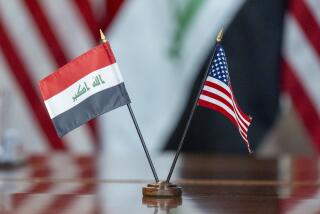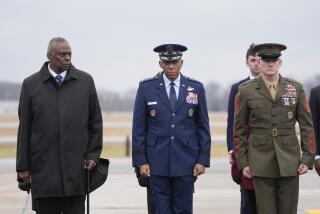Bin Laden’s Top Deputy Targeted in U.S. Strike
WASHINGTON — A U.S. airstrike on a suspected Al Qaeda compound in a remote region of Pakistan targeted Osama bin Laden’s second in command, U.S. officials said Friday, adding that they were investigating the possibility that the Egyptian militant had been killed.
The CIA and other counter-terrorism agencies would not comment officially on speculation that Ayman Zawahiri was among a handful of suspected senior Al Qaeda militants killed in the airstrike in the Bajaur region near the Afghan border early Friday. Nor would they say on the record whether U.S. warplanes or unmanned Predator drones had fired precision-guided missiles on at suspected militant hide-outs in the area, as reported by Pakistani officials and eyewitnesses.
The Pakistanis said the attack killed at least 18 people and wounded six.
A senior U.S. counter-terrorism official, who spoke on condition of anonymity because of the sensitivity of the information, said a compound that had been attacked was known to be frequented by Zawahiri and other top Al Qaeda operatives. Pakistani military sources told officials in Washington that they believed Zawahiri might have been among the dead, the official said.
The official said that U.S. authorities had been monitoring the location for months in hopes of striking at Zawahiri and that drones were sent to kill him when intelligence indicated he was there.
Although it was too early to tell whether Zawahiri or any other key Al Qaeda operative had been killed, the official called reports coming out of Pakistan encouraging, saying U.S. intelligence and counter-terrorism authorities view them with unusual optimism.
The official acknowledged that false reports of Zawahiri’s death have been made from time to time. “There is something different about this one,” the official said. “This seems to have validity.”
It was the second such strike on targets inside Pakistan within a week. The incident occurred just days after Pakistan lodged a strong protest with U.S.-led forces in Afghanistan, saying cross-border fire in the nearby North Waziristan area killed eight people.
In addition, Pakistanis said in December that Al Qaeda operative Abu Hamza Rabia was killed by an explosion at his home in the area. Pakistan disputed residents’ claims that a U.S. missile caused the blast.
U.S. counter-terrorism officials said Washington was eagerly awaiting more information from Pakistan after daybreak today. They said identifying the bodies could take several days.
A doctor who was imprisoned in his native Egypt for terrorism, Zawahiri has long been Bin Laden’s chief aide and Al Qaeda’s spiritual leader. Zawahiri has replaced Bin Laden as the organization’s most visible figure, issuing videotaped statements condemning the U.S. presence in Iraq and calling on Muslims to fight there and elsewhere against U.S. and Western interests.
For years, Zawahiri and Bin Laden were inseparable, several U.S. counter-terrorism officials said. But the two are believed to have been physically separated for some time, in part to make it harder for their pursuers to kill them simultaneously.
The U.S. counter-terrorism official said they probably were not together Friday. “They have been separated. Not too far away, but separate,” the official said.
U.S. officials have long thought that Bin Laden and Zawahiri, who fled Afghanistan after the U.S.-led war to oust the Taliban in 2001, were hiding along the rugged Afghan-Pakistani border. Other senior Al Qaeda figures, including Khalid Shaikh Mohammed, organizer of the Sept. 11 attacks, have been captured or killed in Pakistan.
Many counter-terrorism officials believe that the Al Qaeda terrorist network has become a much more decentralized organization than it was before the 2001 attacks, when it ran training camps in Afghanistan.
U.S. officials said killing Zawahiri would be the biggest success so far in Washington’s war on terrorism, but it could also spark a backlash from Al Qaeda sympathizers around the world.
Bin Laden has not been heard from publicly since December 2004, and some U.S. officials suspect that he is incapacitated. Other U.S. authorities say Zawahiri has long been the true mastermind of Al Qaeda.
Zawahiri issued a new videotaped message last week, calling on President Bush to admit defeat in Iraq. The video appeared to have been made in December.
In his message, Zawahiri declared that a U.S. pullout from Iraq was “only a matter of time.”
“You were defeated in Iraq, you are being defeated in Afghanistan and you will be defeated in Palestine, God willing,” Zawahiri said.
U.S. operations against suspected Al Qaeda figures are politically dangerous for Pakistani President Pervez Musharraf, a close U.S. ally. Islamic parties, which represent the main political opposition in parliament and govern two provinces bordering Afghanistan, accuse Musharraf of ceding too much sovereignty to Washington’s anti-terrorism campaign.
Witnesses and officials in border regions have accused U.S. forces in Afghanistan of launching attacks inside Pakistan. Pakistani army leaders insist that such actions are out of bounds for the U.S. military.
Area residents and a member of parliament from the Bajaur region told reporters Friday that that four U.S. aircraft entered Pakistani territory from Afghanistan about 3 a.m. and attacked residential compounds in the village of Berkandi. The area borders Afghanistan’s Kunar province, where U.S.-led forces are battling Taliban and allied insurgents. The tribal area is about 70 miles north of Peshawar in northwestern Pakistan.
“I saw four aircraft enter the area from Kunar province, which circled over the area for half an hour,” resident Mohammed Rafiq said. “The planes made several sorties and fired missiles, which caused loud explosions.”
Witnesses said 14 of those killed in the blasts belonged to one family. Haji Haroon Rashid, the Bajaur lawmaker, said he witnessed the attack and alleged that a spy plane had been seen flying over the area for days.
“I left my bed immediately after hearing the loud noise of planes. Thousands of other people were also watching the aircraft for half an hour, which fired nine missiles,” Rashid said. “They killed innocent children and women who have absolutely no connection with terrorism.”
In Kabul, the Afghan capital, U.S. military spokesman Lt. Mike Cody told Associated Press that he had no report of an attack.
Army Maj. Gen. Shaukat Sultan, a Pakistani spokesman, said he did not know the cause of the blasts, but he confirmed that they caused casualties.
Foreign Ministry spokeswoman Tasneem Aslam said it was unclear whether the explosions were caused by a cross-border rocket attack or whether they originated inside Pakistan. She and Sultan said the incident was under investigation.
*
Times staff writer Meyer reported from Washington and special correspondent Ali from Peshawar. Special correspondent Mubashir Zaidi in Islamabad, Pakistan, and staff writers Greg Miller in Washington and Paul Watson in New Delhi contributed to this report.
More to Read
Sign up for Essential California
The most important California stories and recommendations in your inbox every morning.
You may occasionally receive promotional content from the Los Angeles Times.










